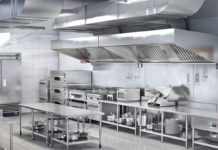Commercial microwaves can provide excellent results, say suppliers
A commercail microwave is one of the kitchen “workhorses” which most eateries cannot do without.
That’s the claim from catering equipment suppliers, who highlighted the microwave’s many uses, from heating a meal or a sauce to defrosting food.
![006_HUW_5791[4]](https://sltn.tempurl.host/wp-content/uploads/2015/05/006_HUW_57914.jpg)
Since coming to the fore in the 1980s, microwaves have not always been associated with quality food. But Robin Candy, Buffalo brand director at catering equipment supplier Nisbets, argued that advancing technology has helped improve the microwave’s reputation.
He said: “Microwaves can be a god-send – but they often come with the perception that quality food and microwaves don’t mix.
“However, with the advances in technology and the reduced costs of the equipment, microwaves are now common in the vast majority of establishments, with the perception that food produced in them lacks quality and is tasteless now a thing of the past.
“Nowadays operators are creating more exciting combinations and using better quality ingredients, with the knowledge that microwave equipment is capable of producing meals to the required standard.”
In fact, commercial microwaves are now increasingly used as the main cooking equipment in the kitchen, according to Simon Frost, chairman of CESA (the Catering Equipment Suppliers Association).
He said they “can give excellent results, for example when preparing sauces or steaming foods such as fish and vegetables”.
“Another reason for their popularity is their energy efficiency – plus, as they don’t generate much in the way of waste heat or steam, they have negligible impact on extraction systems,” he said.
Frost urged operators to consider combination microwave technology as new technological advances emerge on the market.
“Turbo microwave ovens combine a convection oven with built-in microwave assistance and sometimes have a grill feature,” he said.
“They cook much faster than a standard convection oven and will brown the food.”
Combination technology was also advocated by Michael Eyre, product director of Jestic Foodservice Equipment.
He said: “With space and time being two of the biggest constraints to many chefs and operators, the ability to be able to quickly prepare a wide range of menu offers, to a consistent, uniform quality and on a compact footprint is something that many will welcome.”
Eyre claimed freshly baked bread, salmon fillets, joints of meat and roasted vegetables have all been produced to a high standard using the combination oven.
Ray Hall, managing director of RH Hall, said the versatility of today’s microwave ovens is “underestimated”.
He said they produce “excellent cooking results” in a fraction of the time it takes to cook foods conventionally.
![005_HUW_5851[3]](https://sltn.tempurl.host/wp-content/uploads/2015/05/005_HUW_58513.jpg) “Many foods and dishes can be cooked very, very well in a microwave oven: cakes, sauces, meat, fish, vegetables, fruit, pasta, rice, eggs and jams can all be cooked with great results,” added Hall.
“Many foods and dishes can be cooked very, very well in a microwave oven: cakes, sauces, meat, fish, vegetables, fruit, pasta, rice, eggs and jams can all be cooked with great results,” added Hall.
Before purchasing equipment, operators must first consider what they will be using it for, said Iain Phillips, sales and marketing manager for commercial catering equipment at Panasonic UK.
He said there are “five main categories” of microwave to choose from including light duty/semi-professional for single portions heated infrequently; medium duty 1000W for a busy café or fast food environment; heavy duty compact for food-led pubs; gastronorm for larger scale caterers; and the combi microwave which gives grill flexibility.
“Consider what you will use your microwave for before buying; with an 1800W motor, the heavy duty microwave is a standard item in many catering operations, offering durability, reliability and even heat distribution.”
He said operators should expect after sales service from a reputable brand.
If well looked after, Phillips said equipment should last for at least five years.
He added: “A microwave with a high build quality, cleaned daily to the manufacturer’s specifications, positioned correctly in the kitchen, in a medium to heavy use environment, should give five years or more of good service.”
David Watts, general manager of Samsung Professional Appliances, said it is vital that equipment meets the demands of a working kitchen.
“Always buy a commercial microwave oven,” he said. “Domestic models are not built to operate in a commercial environment. Look for microwaves that offer a big oven capacity while keeping the footprint down.”
Equipment, he advised, should
also be bought from an established firm.
“Companies with a long history and trusted reputation should offer caterers peace of mind that they are not a here today, gone tomorrow type of business,” said Watts.























